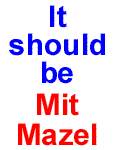A Final Exodus
Exodus from Egypt involved a) destruction of Egypt and b) disengagement from Egypt. This is because ancient Egypt represented the constraints and limits imposed upon us by the unholy - the G-dlessness in the world. This un-holiness is the product of what the Kaballah calls “Tzimtzum” - the ‘hiding of G-d’s face’ and concealment of His presence. In that darkness all wickedness is possible.
The destruction of Egypt was the antidote to that Tzimtzum and made it possible for future generations to live free of such constraints. Once this evil was defeated there was no reason to stay, for it offered no further potential for good. So the children of Israel left that land and were ready to receive the Torah with its instructions on removing all evil from our lives. We have the freedom to do that because we are no longer slaves to Tzimtzum.
Before the coming of the Moshiach we need another exodus to free us of another constraint. This exodus involves a) refinement, not destruction, and b) perfection, not disengagement. This is because the constraint now is the physical world itself.
The world was created out of G-d’s infinite ability to be tiny as well as vast; hence, the world does not truly conceal G-d at all. Indeed, it actually reveals his ‘smallness’ - his ability to care about the little things.
The world shows us one of G-d’s faces; only Tzimtzum hides that fact from us. Remove the Tzimtzum and we see the world for what it is: a finite expression of G-d himself. This is a good thing and must not be destroyed, but it is also a constraint, as it limits our perception of G-d to the finite.
I will not sin, nor deny G-d, because I am free of Tzimtzum’s gravitational pull towards evil. I will serve G-d whom I recognize in creation. It’s His world I live in, he gives me life, so it’s only right to live it the way He wants. I will therefore serve Him whenever I can; in my spare time, with my spare change, when I’m feeling good, as long as it doesn’t interfere with my own life and needs. You know… reasonable, realistic, practical - finite.
This reserved, reasonable relationship with G-d cannot reach intensity of intimacy and is, in the end, sterile. We need another exodus, but this time not an escape from the world, only its refinement. Like refined gold, we separate the good of the world from its limits - for good is endless - and use the world as impetus towards an unconditional enthusiastic devotion to G-d’s vast eternal plan, thus bringing the world its “Tikkun”, or perfection. When it serves as catalyst for a oneness with G-d that is indestructible, ineluctable, ineffable, incomprehensible, and irresistibly and irreducibly Jewish. In other words, intimate!
This accords with the teaching of the Baal Shem Tov that the world is not the enemy. G-d is creating the world at all times and wants to be on earth with us more than in heaven. He therefore is involved in every detail of our lives, protecting us, expecting greatness from us, and looking forward to the day when we - He and his people - can settle down to a permanent intimate relationship in the world that has become the Holy of Holies.
The destruction of Egypt was the antidote to that Tzimtzum and made it possible for future generations to live free of such constraints. Once this evil was defeated there was no reason to stay, for it offered no further potential for good. So the children of Israel left that land and were ready to receive the Torah with its instructions on removing all evil from our lives. We have the freedom to do that because we are no longer slaves to Tzimtzum.
Before the coming of the Moshiach we need another exodus to free us of another constraint. This exodus involves a) refinement, not destruction, and b) perfection, not disengagement. This is because the constraint now is the physical world itself.
The world was created out of G-d’s infinite ability to be tiny as well as vast; hence, the world does not truly conceal G-d at all. Indeed, it actually reveals his ‘smallness’ - his ability to care about the little things.
The world shows us one of G-d’s faces; only Tzimtzum hides that fact from us. Remove the Tzimtzum and we see the world for what it is: a finite expression of G-d himself. This is a good thing and must not be destroyed, but it is also a constraint, as it limits our perception of G-d to the finite.
I will not sin, nor deny G-d, because I am free of Tzimtzum’s gravitational pull towards evil. I will serve G-d whom I recognize in creation. It’s His world I live in, he gives me life, so it’s only right to live it the way He wants. I will therefore serve Him whenever I can; in my spare time, with my spare change, when I’m feeling good, as long as it doesn’t interfere with my own life and needs. You know… reasonable, realistic, practical - finite.
This reserved, reasonable relationship with G-d cannot reach intensity of intimacy and is, in the end, sterile. We need another exodus, but this time not an escape from the world, only its refinement. Like refined gold, we separate the good of the world from its limits - for good is endless - and use the world as impetus towards an unconditional enthusiastic devotion to G-d’s vast eternal plan, thus bringing the world its “Tikkun”, or perfection. When it serves as catalyst for a oneness with G-d that is indestructible, ineluctable, ineffable, incomprehensible, and irresistibly and irreducibly Jewish. In other words, intimate!
This accords with the teaching of the Baal Shem Tov that the world is not the enemy. G-d is creating the world at all times and wants to be on earth with us more than in heaven. He therefore is involved in every detail of our lives, protecting us, expecting greatness from us, and looking forward to the day when we - He and his people - can settle down to a permanent intimate relationship in the world that has become the Holy of Holies.








5 Comments:
Dear Rabbi Friedman,
Why is it that there is absolutely no archeological evidence of the Exodus from Egypt or of the fact that the Jews were ever there at all? Especially since they were there for so many years?
Thank You,
NS
Thanks for the wisdom and for listening to your readership and responding.
Can we hear a word or two about the president's State of the Union address? There were many themes that were world-redemption related. What are your thoughts?
Saad
Dear ns,
Hi and thanks for the feedback.
Here's a little food for thought:
1. It is wrong to draw conclusions from the absence of evidence.
2. People see what they want to see. Secular archeologists are finding nothing. Meanwhile, Christian archeologists are finding all sorts of things…
3. Russian history books have very little mention of the Jewish population. In fact, it has little mention of Khrushchev’s handiwork. Why? Because it is embarrassing. Likewise, Egypt's historical documents recorded an incident where a tribe of slaves tried to escape and failed. (The Medrash has such a record as well.) But no mention of the uccessful 'escape.' Should we be surprised?
4. What kind of evidence would we want in the wilderness? Food came from heaven, their clothing and shoes did not wear and the Medrash tells us that the tribe of Dan picked up all the litter!
Like i said, just some food for thought.
RMF
Saad, hi again. I will have an article posted on the main blog with my thoughts on some of the talk in the SOTU address. It's from a talk I gave shortly after 9/11. Let me know what you think.
RMF
Hi, Rabbi Friedman. Thank you. I look forward to reading your thoughts.
Saad
Post a Comment
<< Home